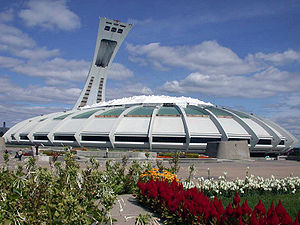User:Etjenkin/sandbox
{{The Olympic Stadium}}
The Olympic Stadium (Montreal) was built in Montreal, Quebec, Canada as a venue for the 1976 summer Olympics. It is located in the Hochelaga-Maisonneuve district of Montreal at 4545 avenue Pierre-de-Coubertin.[1]

Description
[edit]Ths stadium is a horizontal cantilever structure designed by French architect Roger Taillibert.[2] The structure is made of prestressed and post tensioned concrete. The original roof was not added until 1987. It was a steel cable suspended membrane of PVC coated Kevlar fabric[3]. The tower was added after the Olympic Games and is the highest inclined tower in the world. Its incline measures 165 meters at a 45 degree angel. It weighs 183,000 imperial tons[4].
Qualifications as Structural Art
[edit]Despite the grandeur of the tower, the Olympic Stadium has failed to become a symbolic piece of structural art. This failure is due to high costs and engineering inefficiencies.
In terms of economy, the stadium is currently the second most expensive stadium ever built, earning itself the nickname, The Big Owe.[5] Montreal taxpayers were unable to pay off the debt left by stadium construction until 2006.[6] The current amount of revenue generated by the stadium annually is approximately $52.1 million. This is a meager amount in comparison to other former Olympic venues, such as BC Pavilion in Vancouver which is projected to generate upwards of $100 million annually.[7]
On the level of technological efficiency, it is important to note that initially there was no roof on the structure. The roof was not added until 1987 due in part to costs but also because the tower was initially too heavy, and required a redesign before it could be added to the structure. This original roof needed to be replaced in 1998 and in 2010 it was announced that it will be replaced once again. [8]
Ultimately the design and construction of the Olympic Stadium has proved to be technologically and economically satisfying. This structure lacks overall efficiency. Without this sense of efficiency, elegance is nearly impossible to achieve, thus the Olympic Stadium fails to meet the necessary criteria to be classified as structural art.[9]
References
[edit]- ^ http://en.structurae.de/structures/data/index.cfm?id=s0003512
- ^ http://en.structurae.de/structures/data/index.cfm?id=s0003512
- ^ http://en.structurae.de/structures/data/index.cfm?id=s0000742
- ^ http://www.parcolympique.qc.ca/en/the-olympic-park/our-organization/data-and-statistics/#1
- ^ http://www.cbc.ca/news/canada/montreal/story/2006/12/19/qc-olympicstadium.html
- ^ http://www.forbes.com/2008/08/06/expensive-stadiums-worldwide-forbeslife-cx_ae_0806sports.html
- ^ http://finance-commerce.com/2011/10/canadian-stadium-holds-lessons-for-metrodome/
- ^ http://www.cbc.ca/news/canada/montreal/story/2010/06/29/olympic-stadium-roof.html
- ^ Billington, David (1983). The Tower and the Bridge. New York: Basic Books
